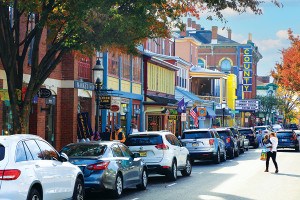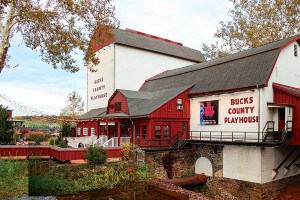The Other Message From the ReNewbold Groundbreaking

Rendering of the new PostGreen Point Breeze development reNewbold.
If you wanted to see why rumors were circulating about John Longacre running for City Council, you should have been at the reNewbold groundbreaking ceremony on Wednesday afternoon. If you wanted to see why he isn’t, you should have been at the ceremony as well.
And if you wanted to learn what the community leadership of Point Breeze really thinks about new development, this was also a good place to be.
Besides Longacre and representatives of the other businesses that worked to bring this ultra-green residential-commercial development about, the ceremony featured two people who are deeply involved in Point Breeze redevelopment issues: City Councilman Kenyatta Johnson (D-2nd District) and Claudia Sherrod, executive director of South Philadelphia H.O.M.E.S. Inc. (SPHINC), Point Breeze’s community development corporation and Registered Community Organization for zoning matters.
You may have seen those names in the news in connection with other development stories emanating from Point Breeze. And from some of those stories, you might have walked away with the impression that they were less than supportive of the transformation taking place in the area.
The groundbreaking, if nothing else, put the lie to that. Moreover, Johnson revealed his hand earlier that morning with an op-ed on Philly.com in which he came out in favor of keeping the city’s 10-year property tax abatement for new construction and improvements on residential property intact.
But neither Johnson nor Sherrod were directly involved in the reNewbold project. The development, a LEED Platinum-certified project that will add 16 townhouses, two condos and corner retail space to Newbold, also known as the southeast corner of Point Breeze, was 100 percent privately funded. And Sherrod was there in part to say “No hard feelings,” for her group had tried to redevlop the closed St. Katharine Drexel School, which sat on the site, as affordable housing 10 years earlier, only to be rebuffed by the neighbors. The reNewbold homes, while reasonably priced for housing of its type, would hardly be affordable to the Point Breeze residents SPHINC targets with support and services, and we suspect that difference may also account for the different reception neighbors gave the two projects.
We didn’t ask Longacre why he invited them to the groundbreaking, but we don’t think we had to. It helped both of them cement their reputations in the community and show that they were interested in advancing all of it.
A sizable number of Point Breeze residents do not believe the area’s other major developer, OCF Realty owner Ori Feibush, shares those goals. They have made Point Breeze zoning meetings contentious affairs when projects Feibush proposes are on the drawing board and put Sherrod in the unenviable position of referee.
The fact remains that both Longacre and Feibush are largely developing projects aimed at the same demographic: younger, more affluent residents, many of them new to the city, who are looking for amenity-rich houses they can afford. (Most of these people are also white, which neither Johnson nor Sherrod are. But so are a good number of Feibush’s Point Breeze critics, including most of the membership of the Point Breeze Organizing Committee.)
Which, when combined with this event, suggests that the different reactions may be a matter of style rather than substance. A real estate agent of our acquaintance once said of Feibush, “He’s doing the right thing, but going about it all wrong,” and Feibush’s it’s-better-to-ask-forgiveness-than-permission approach to development may account for both that assessment and his critics’ accusations that he ignores the community in pursuing development. In contrast, the subliminal message Longacre sent with the reNewbold groundbreaking is “I get things done by working with the community.”
Working with the community is not easy: Residents have their own agendas that often really are at odds with those of builders and developers. RCOs in many neighborhoods often pick projects apart with myriad detailed complaints, delaying them and adding to their cost. Just about every developer in the city can recount a project that had a difficult birth because of the community zoning process. ReNewbold was itself delayed – this groundbreaking should have happened almost a year ago, but various technical and environmental matters pushed back the start of construction. But the patience paid off, as Longacre himself alluded to in his opening remarks at the groundbreaking.
Regardless of the methods, the end result is the same: Point Breeze gets a little more gentrified. But if one is willing to let others share credit, the process will be less turbulent.


